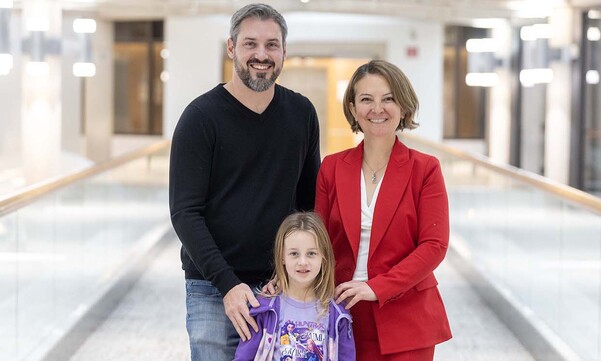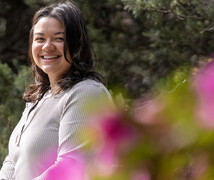When the Olaizs learned their unborn baby had a heart condition, they were transferred to Duke's maternal-fetal experts for care during her high-risk pregnancy. Heart surgery immediately following the delivery, and comprehensive follow up care, ensures their baby girl, Mical, will have a healthy future.
Receiving Hard News
Twenty weeks into her first pregnancy, Lara and Alfonso Olaiz of Durham were excited to learn the gender of their new baby. Their anticipation quickly turned to worry on the day of the ultrasound.
“The sonographer hesitated during the test, so we knew something was wrong,” says Lara. “When she left the room, we froze. Then we started to pray.”
They soon discovered their baby girl’s heart wasn’t developing properly.
“Our practice works closely with Duke so we immediately transferred Lara’s care to their maternal-fetal medicine specialists, explains Tanya Moore, FNP, the Olaiz’s obstetric care provider at Duke Women’s Health Associates. Maternal-fetal medicine specialists are specially trained to work closely with pregnant women when the mom-to-be or the unborn baby has a medical condition that may put the woman and the pregnancy at high risk for complications. “The transfer of care ensured she would have access to specialty care and additional resources as soon as possible.”
Testing confirmed the baby had a congenital heart condition called hypoplastic left heart syndrome (HLHS). The left pumping chamber of her heart was not fully developed. The baby would need surgery immediately after delivery.
“HLHS is fatal within the first two to three weeks of life if not treated,” says Robert Jaquiss, MD, a pediatric heart surgeon at Duke. “Fortunately, advances in echocardiography now allow us to diagnose the condition in utero, so we know what’s coming and we can prepare kids for an operation when they are healthy. Today, survival rates are between 85% and 90%.”
Lara met with Dr. Jaquiss during her pregnancy to discuss the surgery. “He was knowledgeable and explained in detail all we needed to know. He was also down to earth and really interested in families and excited about babies’ development and growth.”
Duke Surgeons Offer Hope
Olaiz was followed closely during her pregnancy. An induction was scheduled, but Olaiz’s labor came naturally. After 15 hours, her daughter Mical arrived. “It was a great experience,” says Olaiz. “She looked beautiful; you would never know she had a heart condition.”
The new parents were able to hold Mical for a short time before she was taken to the neonatal intensive care unit (NICU) for monitoring. “I knew they were going to take her, but it was difficult to let her go,” Lara says. “I was comforted by the fact that she was in such good hands, with people who had the expertise to save her life.”
Mical spent three days in the NICU prior to her first surgery. A second procedure was performed three and a half months later. “The second procedure was easier than the first,” Lara recalls. “After the first surgery, she had to be intubated for a week. We couldn’t talk to her because it would stimulate her and make her heart beat faster. She was in the hospital for two months. It was really hard.”While caring for their baby, the Olaizs learned more than they ever wanted to know about oxygen levels and anatomy. “Lara and Alfonso are some of the most involved, intelligent, and committed parents I have ever met,” says Dr. Jaquiss. “For a child like Mical who requires a lot of attention, they have a lot to give. Lara is also generous with other parents, sharing the lessons she’s learned and informing us how we can do what we do better.”
A Healthy Future
The Olaiz’s dedication to their baby’s health is paying off. At one year old, Mical is doing fine. “You can’t tell she’s had surgery at all,” Lara says. “She is now walking and running, so she’s right where she needs to be. She is sweet and outgoing; she blows kisses and says ‘hi’ to everyone in the room.”
Mical will need one more surgery in the next year or two to help her heart pump more efficiently, and to normalize her resting oxygen levels. However, with her parents’ love and support, and her skilled team of doctors by her side, she has all the ingredients for a healthy future.





